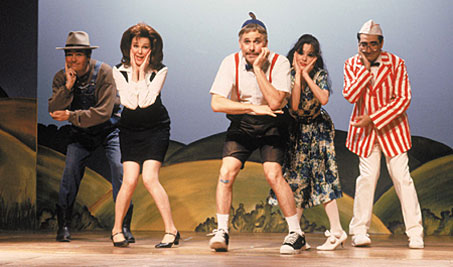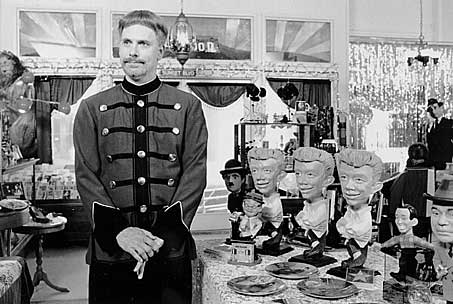
 |
||||||
|
GAY
FILM REVIEWS BY MICHAEL D. KLEMM
|
||||||
|
Waiting For Guffman Warner Brothers, 1996 Director: Screenplay: Christopher Guest and Eugene Levy Starring: Christopher Guest, Catherine O'Hara, Fred Willard, Eugene Levy, Parker Posey, Bob Balaban, Matt Keeslar. Rated R, 84 minutes
|
The
Show Must
Improv director extraordinaire Christopher Guest's recent mockumentary, Best in Show was a hit with both critics and audiences. When it made its debut on DVD, with commentaries and extras, I hoped that his earlier effort, Waiting for Guffman would be given the same treatment. I just got my Christmas wish. |
|
The simple plot is set in Blaine, Missouri. Blaine is a fictional small town straight out of The Andy Griffith Show. Their biggest industry was once the manufacture of fancy footstools and so the town's official slogan is "The Stool Capital Of The World." The main character is Corky St. Clair (Guest), who worked as an actor, director and choreographer in New York City for 25 years before returning to his hometown. He is the high school drama teacher and directs the Blaine Community Players. Blaine is celebrating its sesquicentennial and Corky has been asked to write and direct the town's pageant, Red, White... and Blaine. |
|
|
From the abysmal auditions to the pathetic production, Guffman is hilarious from beginning to end. This is not a film that goes for cheap belly laughs, instead it indulges in subtleties. Spinal Tap viciously skewered rock archetypes but "Guffman" takes a different approach. Part of its charm is that it never ridicules its characters. Each thinks they are doing something special and there is a charm to their naivete'. Listening to O'Hara and Willard warble "Midnight at the Oasis" and Parker Posey trumpet "Teacher's Pet" at the auditions are among the comedic highlights. |
|
|
Guffman did not have a conventional script. Each of the actors were given notes on their characters and then given free reign to improvise. What is truly amazing about Guffman is that each of the principals are fully realized characters and not just a bunch of people goofing around in front of the camera. Most notable are Fred Willard and especially Catherine O'Hara whose comedic gifts are legendary. (Does anyone remember her sublimely awful lounge singer Lola Heatherton from Second City Television?) |
|
 |
|
|
The pageant itself is the best bad musical I've seen since "Springtime for Hitler" in Mel Brooks' The Producers. The music was written by Guest, along with Michael McKean and Harry Shearer, and they manage to brilliantly lampoon the Broadway musical with the same wit that they savaged heavy metal rock with in This is Spinal Tap. |
|
|
|
|
|
In another nice quasi-gay touch, a council member breaks into tears during the show and remarks afterwards that Corky is a genius and that the only other showbiz personality that comes close to him is Barbra Streisand. |
|
 |
|
|
The new DVD for Waiting For Guffman includes several entertaining deleted scenes, as well as a commentary from Christopher Guest and Eugene Levy. The commentary, however, is a disappointment. When you take into consideration their talents at improvisation, the long stretches of silence during the commentary are inexcusable. Several of their observations are amusing though and the listener does get a sense of how the actors found and created their characters. Lovers of this film will probably also enjoy their more recent comedy, Best in Show (2000) which pokes fun at professional Dog Shows and the obsessed people who enter their pampered pets in them. While not quite as funny as Guffman, Best in Show includes a gay couple and an unexpected lesbian angle amongst the comedic proceedings. [Reviewer's note 2009: Christopher Guest's A Mighty Wind (2003) features a very funny - but not mean-spirited - moment when one of the members of a 1960s folk trio suddenly reveals that he had a sex change and 2006's For Your Consideration details the making of a God-awful independent film, set in the 1940s, called Home For Purim, in which an old dying Jewish mother played by Catherine O'Hara is visited by her prodigal daughter (Parker Posey) who comes out as a lesbian (and also comes home with her partner). In the same fllm, Posey performs the most hilarious, intentionally-bad, "man-hating radical feminist" performance piece you will ever see.]
More On Matt Keeslar: More On Parker
Posey: More On Eugene
Levy: More On Bob Balaban: |